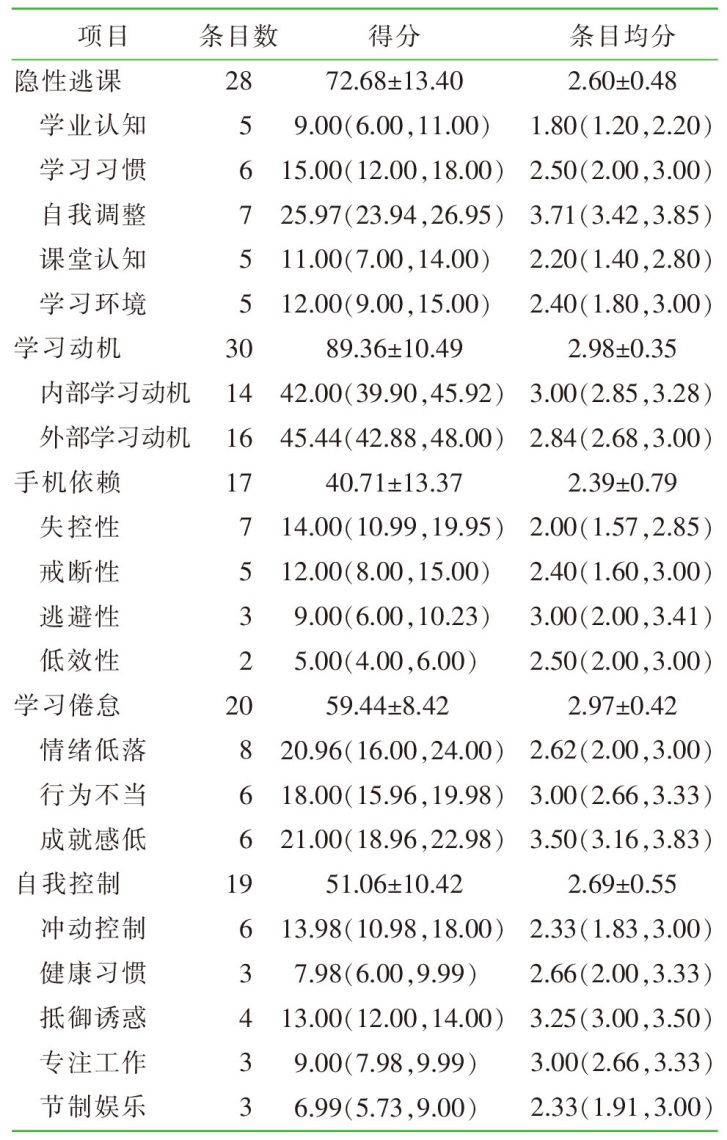| [1] |
周琦. 目标与手段的背离:大学生“隐性逃课”的社会学分析[J]. 当代青年研究, 2001(3):16-17,15.
|
| [2] |
姜晓飞, 孙清松, 钱玉莹. 高校学生隐形逃课现象及对策[J]. 经济研究导刊, 2020(8):98,106.
|
| [3] |
王洋洋, 马骄娜, 尹斐, 等. 本科护生隐性逃课的潜在类别及影响因素决策树分析[J]. 护理学报, 2023, 30(20):37-42.
doi: 10.16460/j.issn1008-9969.2023.20.037
|
|
Wang YY, Ma JN, Yin F, et al. Potential categories of recessive truancy among nursing undergraduates and decision tree analysis for its influencing factors[J]. J Nurs(China), 2023, 30(20):37-42.
doi: 10.16460/j.issn1008-9969.2023.20.037
|
| [4] |
Hevey D. Network analysis:a brief overview and tutorial[J]. Health Psychol Behav Med, 2018, 6(1):301-328.
|
| [5] |
McNally RJ. Network analysis of psychopathology:controversies and challenges[J]. Annu Rev Clin Psychol, 2021, 17:31-53.
|
| [6] |
曾红, 黎光明, 温海英, 等. 大学生隐性逃课与人格特征及核心自我评价的关系[J]. 中国学校卫生, 2011, 32(7):793-794,799.
|
|
Zeng H, Li GM, Wen HY, et al. Relationship among recessive truancy and personality,core self-evaluation for college students[J]. Chin J Sch Health, 2011, 32(7):793-794,799.
|
| [7] |
Su CY, Guo YQ. Factors impacting university students' online learning experiences during the COVID-19 epidemic[J]. J Comput Assist Learn, 2021, 37(6):1578-1590.
|
| [8] |
王玉茹, 张宏晨. 学习动机在护理本科生学业自我概念和隐性逃课间的中介效应[J]. 军事护理, 2024, 41(9):63-66.
|
|
Wang YR, Zhang HC. Mediating effect of learning motivation between academic self-concept and recessive truancy of undergraduate nursing students[J]. Mil Nurs, 2024, 41(9):63-66.
|
| [9] |
Cheng SF, Kuo CL, Lin KC, et al. Development and preliminary testing of a self-rating instrument to measure self-directed learning ability of nursing students[J]. Int J Nurs Stud, 2010, 47(9):1152-1158.
|
| [10] |
苏明宏, 倪小冬, 徐捷, 等. 大学生隐性逃课量表的编制和结构探索[J]. 中国健康心理学杂志, 2015, 23(12):1858-1862.
|
|
Su MH, Ni XD, Xu J, et al. Development of recessive truancy scale for college students[J]. China J Health Psychol, 2015, 23(12):1858-1862.
|
| [11] |
Amabile TM, Hill KG, Hennessey BA, et al. The Work Preference Inventory:assessing intrinsic and extrinsic motivational orientations[J]. J Pers Soc Psychol, 1994, 66(5):950-967.
doi: 10.1037//0022-3514.66.5.950
pmid: 8014837
|
| [12] |
池丽萍, 辛自强. 大学生学习动机的测量及其与自我效能感的关系[J]. 心理发展与教育, 2006, 22(2):64-70.
|
|
Chi LP, Xin ZQ. The measure of learning motivation and the relationship between it and self-efficacy of college students[J]. Psychol Dev Educ, 2006, 22(2):64-70.
|
| [13] |
连榕, 杨丽娴, 吴兰花. 大学生的专业承诺、学习倦怠的关系与量表编制[J]. 心理学报, 2005, 37(5):632-636.
|
|
Lian R, Yang LX, Wu LH. Relationship between professional commitment and learning burn out of undergraduates and scales developing[J]. Acta Psychol Sin, 2005, 37(5):632-636.
|
| [14] |
Leung L. Linking psychological attributes to addiction and improper use of the mobile phone among adolescents in Hong Kong[J]. J Child Medium, 2008, 2(2):93-113.
|
| [15] |
Leung L. Leisure boredom,sensation seeking,self-esteem,and addiction:symptoms and patterns of cell phone use[D]. Hong Kong: Chinese University of Hong Kong, 2008.
|
| [16] |
Bianchi A, Phillips JG. Psychological predictors of problem mobile phone use[J]. Cyberpsychol Behav, 2005, 8(1):39-51.
|
| [17] |
黄海, 牛露颖, 周春燕, 等. 手机依赖指数中文版在大学生中的信效度检验[J]. 中国临床心理学杂志, 2014, 22(5):835-838.
|
|
Huang H, Niu LY, Zhou CY, et al. Reliability and validity of mobile phone addiction index for Chinese college students[J]. Chin J Clin Psychol, 2014, 22(5):835-838.
|
| [18] |
Tangney JP, Baumeister RF, Boone AL. High self-control predicts good adjustment,less pathology,better grades,and interpersonal success[J]. J Pers, 2004, 72(2):271-324.
doi: 10.1111/j.0022-3506.2004.00263.x
pmid: 15016066
|
| [19] |
谭树华, 郭永玉. 大学生自我控制量表的修订[J]. 中国临床心理学杂志, 2008, 16(5):468-470.
|
|
Tan SH, Guo YY. Revision of self-control scale for Chinese college students[J]. Chin J Clin Psychol, 2008, 16(5):468-470.
|
| [20] |
Epskamp S, Fried EI. A tutorial on regularized partial correlation networks[J]. Psychol Methods, 2018, 23(4):617-634.
doi: 10.1037/met0000167
pmid: 29595293
|
| [21] |
Opsahl T, Agneessens F, Skvoretz J. Node centrality in weighted networks:generalizing degree and shortest paths[J]. Soc Netw, 2010, 32(3):245-251.
|
| [22] |
Haslbeck JMB, Waldorp LJ. Mgm:estimating time-varying mixed graphical models in high-dimensional data[J]. J Stat Soft, 2020, 93(8):1-46.
|
| [23] |
Epskamp S, Borsboom D, Fried EI. Estimating psychological networks and their accuracy:a tutorial paper[J]. Behav Res Methods, 2018, 50(1):195-212.
doi: 10.3758/s13428-017-0862-1
pmid: 28342071
|
| [24] |
Jones PJ, Ma RF, McNally RJ. Bridge centrality:a network approach to understanding comorbidity[J]. Multivariate Behav Res, 2021, 56(2):353-367.
|
| [25] |
Wickham H. Ggplot2:elegant graphics for data analysis[M]. 2nd ed. New York: Springer, 2016.
|
| [26] |
葛晓梅, 贺书平, 张平, 等. 大学生专业课学习中隐性逃课行为的现状调查与分析[J]. 科教文汇, 2022(9):35-39.
|
|
Ge XM, He SP, Zhang P, et al. Investigation and analysis on the current situation of recessive truancy in college students' professional courses[J]. Sci Educ Colle, 2022(9):35-39.
|
| [27] |
刘珍莲. 浅谈护理专业学生的压力应对教育[J]. 护理研究, 2005, 19(1):88.
|
|
Liu ZL. Talking on stress coping education of students in nursing specialty[J]. Chin Nurs Res, 2005, 19(1):88.
|
| [28] |
Deci EL, Ryan RM. Intrinsic motivation and self-determination in human behavior[M]. New York: Plenum, 1985.
|
| [29] |
张道芬, 高晓妹, 胡玲. 医学生专业认同与学业倦怠的关系:学业自我效能感与学习投入的链式中介作用[J]. 锦州医科大学学报(社会科学版), 2024, 22(3):73-76.
|
|
Zhang DF, Gao XM, Hu L. The relationship between professional identity and academic burnout among medical students:the chain mediating role of academic self-efficacy and learning engagement[J]. J Jinzhou Med Univ Soc Sci Ed, 2024, 22(3):73-76.
|
| [30] |
于晓琳. 影响大学生隐性逃课的心理因素:基于优势分析的实证研究[J]. 中国健康心理学杂志, 2021, 29(9):1386-1391.
|
|
Yu XL. Psychological factors on recessive truancy in undergraduates:an empirical study based on dominance analysis[J]. China J Health Psychol, 2021, 29(9):1386-1391.
|
| [31] |
杨院. 以学习投入为中介:学生学习信念影响学习收获的机制探究:以“985高校”本科生为例的分析[J]. 高教探索, 2016(3):75-78.
|
| [32] |
刘芳. 大学生手机依赖对课堂教学的不良影响及应对[J]. 黑河学刊, 2014(1):171-173.
|
| [33] |
Leisterer S, Paschold E. Increased perceived autonomy-supportive teaching in physical education classes changes students' positive emotional perception compared to controlling teaching[J]. Front Psychol, 2022, 13:1015362
|








